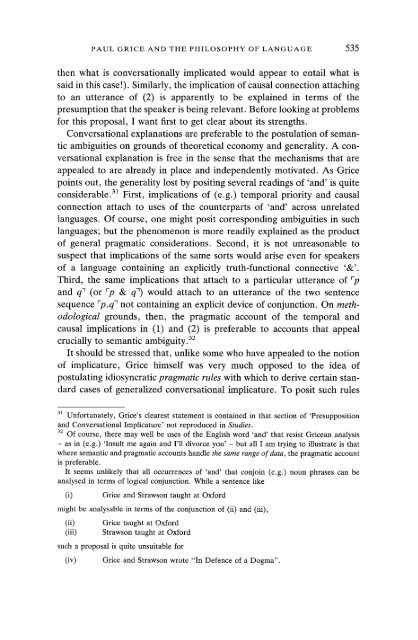Paul Grice and the philosophy of language
Paul Grice and the philosophy of language
Paul Grice and the philosophy of language
You also want an ePaper? Increase the reach of your titles
YUMPU automatically turns print PDFs into web optimized ePapers that Google loves.
PAUL GRICE AND THE PHILOSOPHY OF LANGUAGE 535<br />
<strong>the</strong>n what is conversationally implicated would appear to entail what is<br />
said in this case!). Similarly, <strong>the</strong> implication <strong>of</strong> causal connection attaching<br />
to an utterance <strong>of</strong> (2) is apparently to be explained in terms <strong>of</strong> <strong>the</strong><br />
presumption that <strong>the</strong> speaker is being relevant. Before looking at problems<br />
for this proposal, I want first to get clear about its strengths.<br />
Conversational explanations are preferable to <strong>the</strong> postulation <strong>of</strong> semantic<br />
ambiguities on grounds <strong>of</strong> <strong>the</strong>oretical economy <strong>and</strong> generality. A conversational<br />
explanation is free in <strong>the</strong> sense that <strong>the</strong> mechanisms that are<br />
appealed to are already in place <strong>and</strong> independently motivated. As <strong>Grice</strong><br />
points out, <strong>the</strong> generality lost by positing several readings <strong>of</strong> '<strong>and</strong>' is quite<br />
considerable. 3~ First, implications <strong>of</strong> (e.g.) temporal priority <strong>and</strong> causal<br />
connection attach to uses <strong>of</strong> <strong>the</strong> counterparts <strong>of</strong> '<strong>and</strong>' across unrelated<br />
<strong>language</strong>s. Of course, one might posit corresponding ambiguities in such<br />
<strong>language</strong>s; but <strong>the</strong> phenomenon is more readily explained as <strong>the</strong> product<br />
<strong>of</strong> general pragmatic considerations. Second, it is not unreasonable to<br />
suspect that implications <strong>of</strong> <strong>the</strong> same sorts would arise even for speakers<br />
<strong>of</strong> a <strong>language</strong> containing an explicitly truth-functional connective '&'.<br />
Third, <strong>the</strong> same implications that attach to a particular utterance <strong>of</strong> rp<br />
<strong>and</strong> qn (or rp & q~) would attach to an utterance <strong>of</strong> <strong>the</strong> two sentence<br />
sequence rp.qn not containing an explicit device <strong>of</strong> conjunction. On methodological<br />
grounds, <strong>the</strong>n, <strong>the</strong> pragmatic account <strong>of</strong> <strong>the</strong> temporal <strong>and</strong><br />
causal implications in (1) <strong>and</strong> (2) is preferable to accounts that appeal<br />
crucially to semantic ambiguity. 32<br />
It should be stressed that, unlike some who have appealed to <strong>the</strong> notion<br />
<strong>of</strong> implicature, <strong>Grice</strong> himself was very much opposed to <strong>the</strong> idea <strong>of</strong><br />
postulating idiosyncratic pragmatic rules with which to derive certain st<strong>and</strong>ard<br />
cases <strong>of</strong> generalized conversational implicature. To posit such rules<br />
31 Unfortunately, <strong>Grice</strong>'s clearest statement is contained in that section <strong>of</strong> 'Presupposition<br />
<strong>and</strong> Conversational Implicature' not reproduced in Studies.<br />
32 Of course, <strong>the</strong>re may well be uses <strong>of</strong> <strong>the</strong> English word '<strong>and</strong>' that resist <strong>Grice</strong>an analysis<br />
- as in (e.g.) 'Insult me again <strong>and</strong> I'll divorce you' - but all I am trying to illustrate is that<br />
where semantic <strong>and</strong> pragmatic accounts h<strong>and</strong>le <strong>the</strong> same range <strong>of</strong> data, <strong>the</strong> pragmatic account<br />
is preferable.<br />
It seems unlikely that all occurrences <strong>of</strong> '<strong>and</strong>' that conjoin (e.g.) noun phrases can be<br />
analysed in terms <strong>of</strong> logical conjunction. While a sentence like<br />
(i)<br />
<strong>Grice</strong> <strong>and</strong> Strawson taught at Oxford<br />
might be analysable in terms <strong>of</strong> <strong>the</strong> conjunction <strong>of</strong> (ii) <strong>and</strong> (iii),<br />
(ii)<br />
(iii)<br />
<strong>Grice</strong> taught at Oxford<br />
Strawson taught at Oxford<br />
such a proposal is quite unsuitable for<br />
(iv)<br />
<strong>Grice</strong> <strong>and</strong> Strawson wrote '"In Defence <strong>of</strong> a Dogma".














